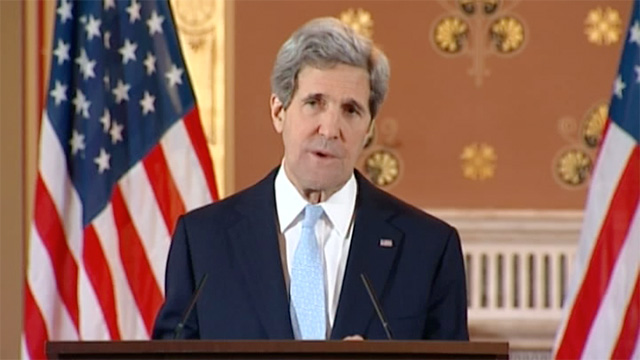In the Middle East, Time to Move On
Apr 16 2014 / 7:45 pm
John Whitbeck’s commentary:
Transmitted below is a New York Times editorial which comes remarkably close to assigning blame for the inevitable failure of the Kerry round of the perpetual “peace process” to Israel.
John Kerry, in an unguarded moment of honesty, did the same thing during his recent “poof” testimony to Congress … before the State Department launched a frantic effort to argue that the secretary of state didn’t really mean what he said.
By The New York Times Editorial Board.
New York Times – The pointless arguing over who brought Israeli-Palestinian peace talks to the brink of collapse is in full swing. The United States is still working to salvage the negotiations, but there is scant sign of serious purpose. It is time for the administration to lay down the principles it believes must undergird a two-state solution, should Israelis and Palestinians ever decide to make peace. Then President Obama and Secretary of State John Kerry should move on and devote their attention to other major international challenges like Ukraine.
Among those principles should be: a Palestinian state in the West Bank and Gaza with borders based on the 1967 lines; mutually agreed upon land swaps that allow Israel to retain some settlements while compensating the Palestinians with land that is comparable in quantity and quality; and agreement that Jerusalem will be the capital of the two states.
Perhaps the Obama administration’s effort to broker a deal was doomed from the start. In 2009, the administration focused on getting Israel to halt settlement building and ran into the obstinacy of Prime Minister Benjamin Netanyahu and resistance from the Palestinian president, Mahmoud Abbas, to entering peace talks. Since then, members of Mr. Netanyahu’s coalition government have tried to sabotage the talks. As Tzipi Livni, Israel’s chief negotiator, told the website Ynet, “There are people in the government who don’t want peace.” She cited Naftali Bennett, the leader of the pro-settler party Jewish Home, and Uri Ariel, the housing minister.
Mr. Obama made the right decision to give it a second try last summer, with Mr. Kerry bringing energy and determination to the negotiations. But, after nine months, it is apparent that the two sides are still unwilling to move on the core issues of the borders of a Palestinian state, the future of Jerusalem, the fate of Palestinian refugees and guarantees for Israel’s security. The process broke down last month when Israel failed to release a group of Palestinian prisoners as promised and then announced 700 new housing units for Jewish settlement in a part of Jerusalem that Palestinians claim as the capital of a future state. According to Mr. Kerry that was the “poof” moment when it all fell apart, and the Palestinians responded by applying to join 15 international conventions and treaties. That move won’t get them a state, but it is legal and they did not seek to join the International Criminal Court, a big fear of Israel’s.
In recent days, Israel, which denounced the Palestinians for taking unilateral steps, took its own unilateral steps by announcing plans to deprive the financially strapped Palestinian Authority of about $100 million in monthly tax revenues and retroactively legalizing a 250-acre outpost in the Gush Etzion settlement, which the Israeli newspaper Haaretz said was the largest appropriation of West Bank land in years.
An Israeli-Palestinian peace deal is morally just and essential for the security of both peoples. To achieve one will require determined and courageous leaders and populations on both sides that demand an end to the occupation. Despite the commitment of the United States, there’s very little hope of that now.

